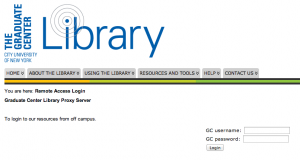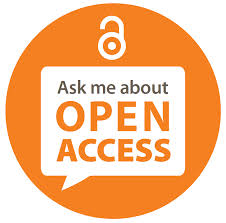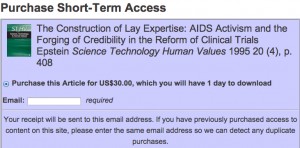Librarians have been too successful. We have made it seamless for faculty and students to get to licensed electronic books and articles that are, in fact, locked behind paywalls. We render paywalls completely invisible to searchers in library IP-space. And off-site users are guided through proxy servers to their information destination with minimal interruption, sometimes only once the first time we login.
We’ve made it easy, then, for those within academic institutions to not realize that anyone outside, without a research library to go to, without university credentials to unlock access, is blocked from the databases, books, and articles we in higher education enjoy for free.

Well, it’s not really free. University readers pay for access with taxes and tuition, not with a credit card like unaffiliated readers must.
Universal, open access publishing is essential to extending the works and benefits of higher education. Publishing “open access” allows authors to connect with the widest possible audiences, locally and globally.
We in higher ed must rethink how we produce, distribute, and value scholarship. Why do scholars write? Why is scholarly publishing out of reach to so many readers? What evidence signals that scholarship is meaningful?
Some of the pressing questions about open access publishing and scholarly communication include:
- Can MOOCs succeed without open online scholarship?
- Does open access publishing threaten university presses, learned societies, the peer review system, and academic life as we know it?
- How do I guard against predatory publishers trying to make a buck off of OA publication fees?
- How does an author find an open access journal or publisher?
- How does an over-extended public university academic actually self-archive work that is already published? Is academia.edu any good?
- How does an over-extended public university academic editing a peer-reviewed journal make that journal open access without sacrificing all free time to the effort?
- What started this open access craze, and why are librarians smack in the middle of it? Is it just a fad?
- How can a CUNY scholar negotiate with a prestigious publisher to retain copyright to a work, and live to tell about it?
- What are Creative Commons licenses, and what does copyright have to do with open access publishing?
- What the heck is metadata, and what does it have to do with open access publishing?
- Do social scientists and humanists really have to worry about open access scholarship? Our journals are not so expensive.
- If a publisher’s prestige isn’t as important as the impact of scholarship, how do we evaluate faculty for tenure and promotion?
In this topic series on scholarly communication, I and my CUNY librarian colleagues, will explore open access publishing – its promise and its uncertainties.





